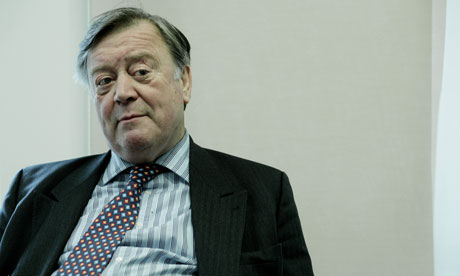 |
| Kenneth Clarke says the British people have 'reason to remember the curse' of Libyan leader Muammar Gaddafi. Photograph: Martin Godwin for the Guardian |
(Guardian News) - Kenneth Clarke has ratcheted up government pressure to depose Colonel Gaddafi by warning that the Libyan leader could stage a Lockerbie-style attack in revenge for Britain's role in the enforcement of the UN resolution if he is left in power.
The lord chancellor told the Guardian: "We do have one particular interest in the Maghreb [the western region of North Africa], which is Lockerbie.
"The British people have reason to remember the curse of Gaddafi – Gaddafi back in power, the old Gaddafi looking for revenge, we have a real interest in preventing that."
Clarke says in the interview that the UN resolution does not support regime change, adding that he would regard occupation as madness. But his remarks suggest British ministers recognise they now have a direct security interest in Gaddafi's removal in light of Libya's involvement in the 1988 Lockerbie bombing which killed 259 people on Pan Am flight 103 and 11 on the ground in the Scottish town.
The justice secretary is also extremely frank in admitting that the UK government has little idea how long the conflict will take or how it will be resolved.
He says: "I am not in the Foreign Office, fortunately, so I am not too worried by my remarks. But I am still not totally convinced anyone knows where we are going now".
His remarks came as a Guardian ICM poll shows more people oppose British involvement in the military action in Libya than support it: 42% against, compared with 36% in favour.
Asked about the purpose of British involvement, 80% support protecting civilians from attack by Gaddafi and 42% said the intervention should help Libyan rebels depose Gaddafi.
Clarke himself contends that "the British people will support us for as long as it takes, so long as they think we are protecting innocent civilians, many of whom seem to share our values against an evil dictator".
Clarke, who was an opponent of the Iraq war and a critic of "havering" over Bosnia, said the UN resolution on Libya "represented a significant event in the evolution of the world order".
Speaking as the cabinet's senior lawyer, he said: "What we seem to have almost established in the international law is the humanitarian basis which can, in exceptional cases, justify intervention by the international community."
He admitted victory would be hard to define: "ou cannot answer what is the destination, what it is going to be the moment when you can see the mission is accomplished. It is a little uncertain, but that would have been a dreadful reason for doing nothing." He added that no expert or pundit had foreseen the democratic uprising in Libya: "I don't think any of them saw it coming. I don't think any of them knew why it started or what started it.
He said: "We have already achieved a great deal by stopping the imminent invasion of Benghazi in the nick of time. We would have seen a lot of innocent people, some of them inspired by the best motives, being killed and a quite lunatic regime back in power, acting as an inspiration to others who want to imitate him. So we have already achieved something."
He admitted there was a risk that Libya could divide: "There has never been any love lost between Tripoli and Benghazi. I don't think at the moment, even on the ground in Libya, the average person who is shooting at the other side is quite clear where this is going to wind up."
Asked if the public would tolerate a long war, Clarke said: "We have strong public support – but, I mean, the invasion of Iraq had strong public support." The public, he said, "will support our participation so long as they are satisfied we are doing it for reasons we said and we are not getting ourselves into the occupation of another complicated tribal country of uncertain politics."
He admitted members of the Obama administration that he had met "had not been interested in Arab uprisings", and had had enough of military adventures.
He said: "We are not going in anyone's dreams, [going] in to start occupying the country. We have ruled it out in the resolution, thank heavens. It would be mad to occupy another country while we are in Afghanistan."
No comments:
Post a Comment